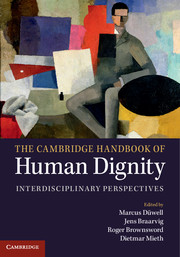Book contents
- Frontmatter
- Contents
- List of contributors
- Foreword
- Why a handbook on human dignity?
- Acknowledgments
- 1 Human dignity from a legal perspective
- 2 Human dignity: concepts, discussions, philosophical perspectives
- Part I Origins of the concept in European history
- Part II Beyond the scope of the European tradition
- Part III Systematic conceptualization
- Part IV Legal implementation
- Part V Conflicts and violence
- Part VI Contexts of justice
- 51 Human dignity and social welfare
- 52 Dignity and global justice
- 53 Human dignity and people with disabilities
- 54 Human dignity as a concept for the economy
- 55 Human dignity and gender inequalities
- 56 The rise and fall of freedom of online expression
- Part VII Biology and bioethics
- Appendix 1 Further reading
- Appendix 2 Universal Declaration of Human Rights
- Index
- References
52 - Dignity and global justice
from Part VI - Contexts of justice
Published online by Cambridge University Press: 05 March 2015
- Frontmatter
- Contents
- List of contributors
- Foreword
- Why a handbook on human dignity?
- Acknowledgments
- 1 Human dignity from a legal perspective
- 2 Human dignity: concepts, discussions, philosophical perspectives
- Part I Origins of the concept in European history
- Part II Beyond the scope of the European tradition
- Part III Systematic conceptualization
- Part IV Legal implementation
- Part V Conflicts and violence
- Part VI Contexts of justice
- 51 Human dignity and social welfare
- 52 Dignity and global justice
- 53 Human dignity and people with disabilities
- 54 Human dignity as a concept for the economy
- 55 Human dignity and gender inequalities
- 56 The rise and fall of freedom of online expression
- Part VII Biology and bioethics
- Appendix 1 Further reading
- Appendix 2 Universal Declaration of Human Rights
- Index
- References
Summary
Dignity is not an independently existing thing, but an attribute – of human beings, for example. It is essential to our notion of dignity that it has two distinct but related meanings. Using one meaning, we say that each human being has an inherent dignity, which is inalienable and equal for all. Using the other meaning, we say that the dignity of human beings is precarious and stands in need of social protection.
We find both meanings used side by side in the Universal Declaration of Human Rights (UDHR). In the first three occurrences of the word, it is used in its first sense:
recognition of the inherent dignity and of the equal and inalienable rights of all members of the human family is the foundation of freedom, justice and peace in the world
(UDHR, Preamble, paragraph 1)the peoples of the United Nations have in the Charter reaffirmed their faith in fundamental human rights, in the dignity and worth of the human person and in the equal rights of men and women
(UDHR, Preamble, paragraph 5)[a]ll human beings are born free and equal in dignity and rights
(UDHR, Article 1)In the next occurrence, ‘dignity’ is used in its other sense:
Everyone, as a member of society, has the right to social security and is entitled to realization, through national effort and international cooperation and in accordance with the organization and resources of each State, of the economic, social and cultural rights indispensable for his dignity and the free development of his personality.
(UDHR, Article 22)To call these rights indispensable for dignity is to say that any person lacking in these rights also falls short in dignity. Article 22 thus suggests that dignity is both alienable and possibly unequal: those who have dignity can lose its indispensable preconditions and therefore dignity itself – and will then not be ‘equal in dignity’ with those who still have it.
- Type
- Chapter
- Information
- The Cambridge Handbook of Human DignityInterdisciplinary Perspectives, pp. 477 - 483Publisher: Cambridge University PressPrint publication year: 2014
References
- 2
- Cited by



